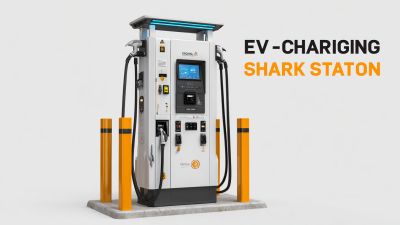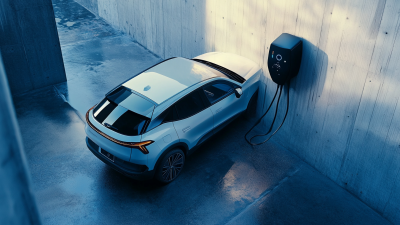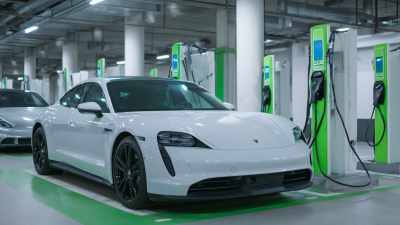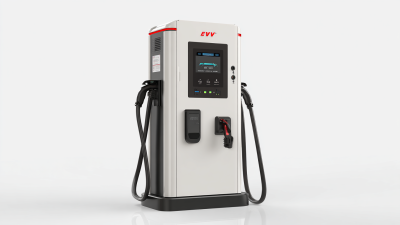As the electric vehicle (EV) market continues to grow, with a reported 54% increase in global EV sales from 2020 to 2021 according to the International Energy Agency, the demand for innovative and eco-friendly charging solutions is more critical than ever. The transition to sustainable mobility hinges not only on advancements in EV technology but also on the ongoing development of supporting infrastructure. Among these advancements, the Portable Electric Vehicle Charger has emerged as a game-changer, offering flexibility and convenience to EV users without compromising environmental standards.

With projections that the global portable EV charger market will reach $2.8 billion by 2026, it is essential to explore the role and future potential of these eco-friendly charging solutions as we navigate the shift towards cleaner and greener transportation alternatives.
The demand for electric vehicles (EVs) continues to rise, prompting the innovation of eco-friendly charging technologies that aim to support a sustainable future. One of the most promising advancements is the development of
wireless charging systems, which uses electromagnetic fields to transfer energy. This not only simplifies the charging process by eliminating the need for physical connectors but also minimizes energy loss, contributing to greater efficiency and less environmental impact.

As the electric vehicle (EV) market continues to expand, the demand for eco-friendly charging solutions is growing at an unprecedented pace. When considering sustainable EV charging stations, several key features become essential.
Firstly, investing in wireless charging systems that utilize inductive or resonant technology can eliminate the need for cumbersome cables, offering a more user-friendly experience while reducing environmental impact. This innovative approach aligns with the global push towards greener solutions, making charging more accessible and efficient.
Another critical aspect to look for in sustainable EV charging stations is the integration of renewable energy sources. Charging stations equipped with solar panels or wind turbines can significantly lower their carbon footprint and operate independently from the grid during peak energy consumption periods. Additionally, smart grid technology can optimize energy use by efficiently managing charging schedules and reducing strain on existing infrastructure.
As we look forward to 2031, the anticipated growth of the EV charging cable market highlights the critical role that these eco-friendly charging solutions will play in shaping the future of sustainable transportation.
The shift towards renewable energy sources for electric vehicle (EV) charging presents numerous advantages that can significantly impact both the environment and the automotive industry. According to a report by the International Energy Agency (IEA), the adoption of renewable energy in the transportation sector can reduce greenhouse gas emissions by up to 70% by 2050. This highlights how integrating wind, solar, and hydroelectric power into the EV charging infrastructure can dramatically lessen the carbon footprint associated with traditional fossil fuel consumption.
Moreover, renewable energy sources can enhance energy security and reduce dependency on imported fuels. The U.S. Department of Energy suggests that by increasing the use of domestic renewable energy to power EVs, the country could reduce its reliance on oil by nearly 2 million barrels per day by 2030. Additionally, utilizing local renewable energy sources not only supports regional economies but also stabilizes energy costs against market volatility. As the technology and infrastructure for eco-friendly charging solutions continue to evolve, the intersection of renewable energy and electric vehicles promises a sustainable future for personal and public transportation alike.
As electric vehicles (EVs) continue to gain popularity, the method by which they are charged can significantly influence their overall environmental impact. Traditional charging solutions, primarily reliant on fossil-fuel-generated electricity, contribute to greenhouse gas emissions that counteract the benefits of EVs. Therefore, a shift towards renewable energy sources—such as solar, wind, and hydroelectric power—is crucial. Integrating these energy sources into charging infrastructure not only minimizes emissions but also promotes sustainable practices within the automotive industry.
Another innovative solution is the development of smart charging technologies that optimize energy use based on grid demand and environmental conditions. For instance, vehicle-to-grid (V2G) technology allows EVs to discharge energy back into the grid during peak times, reducing reliance on non-renewable sources. Moreover, the implementation of efficient charging systems, like fast chargers powered by renewable energy, ensures that EV owners can charge their vehicles quickly without contributing to environmental degradation. By prioritizing these eco-friendly charging solutions, we can enhance the overall sustainability of electric transportation and make significant strides towards a greener future.
| Charging Method | CO2 Emissions (kg per kWh) | Energy Source | Impact on Grid | Cost Efficiency ($ per kWh) |
|---|---|---|---|---|
| Home Charging (Solar) | 0.0 | Solar | Low | 0.12 |
| Public Charging Station (Renewable) | 0.05 | Wind | Moderate | 0.15 |
| Fast Charging Station (Fossil Fuels) | 0.29 | Natural Gas | High | 0.25 |
| Inductive Charging | 0.10 | Grid Mix | Moderate | 0.20 |
| Wireless Charging (Future) | 0.08 | Hybrid | Low | 0.22 |
The development of eco-friendly charging infrastructure for electric vehicles (EVs) is poised to transform the way we think about transportation and energy consumption. As the world shifts toward more sustainable practices, the integration of renewable energy sources into charging networks has become paramount. Solar-powered charging stations, for instance, are gaining traction, allowing drivers to charge their EVs using clean energy while also reducing the strain on traditional power grids. This trend not only promotes environmental responsibility but also enhances the resilience of charging solutions in a world where energy demands are continually evolving.
Another significant trend in eco-friendly charging infrastructure is the deployment of smart charging systems. These systems take advantage of advanced technologies such as IoT and AI to optimize energy usage and minimize emissions. By analyzing data in real time, smart chargers can adjust power delivery based on the availability of renewable energy, peak demand times, and even the driver’s preferences. This ensures that charging EVs becomes not just more efficient but also more sustainable. As cities and governments invest in these innovations, the future of eco-friendly charging solutions looks brighter, paving the way for a more sustainable transportation network overall.







